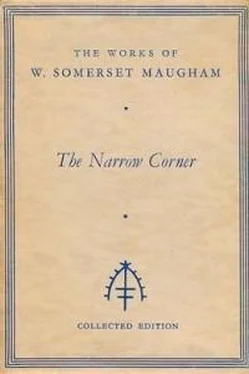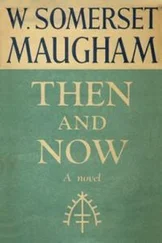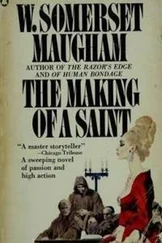Erik walked up the earth road that led to the house and sat down in the chair that faced Louise’s room. The house was dark. It was wrapped in a silence so profound that you might have thought its inmates were not asleep but dead. But there was no fear in the silence. It had an exquisite peace. It reassured you. It was comfortable, like the feel of a girl’s smooth skin. Erik gave a little sigh of content. A sadness, but a sadness in which there was anguish no longer, befell him because dear Catherine Frith was there no more. He hoped that he would never forget the kindness she had shown him when, a shy and callow boy, he had first come to the island. He had worshipped her. She was then a woman of forty–five, but neither hard work nor child–bearing had had any effect on her powerful physique. She was tall and full–breasted, with magnificent golden hair, and she held herself proudly. You would have thought she would live to be a hundred. She took the place for him of the mother, a woman of character and of courage too, that he had left in a farm–house in Denmark, and she loved in him the sons that had been born to her years before and of whom death had robbed her. But he felt that the relation between them was more intimate than it ever could have been if they had been mother and son. They could never have talked to one another so openly. Perhaps it could never have been such a tranquil satisfaction just to be in one another’s company. He loved her and admired her and it made him very happy to be so sure that she loved him. Even then he had an inkling that the love he might one day feel for a girl would never have exactly the restful and comforting quality that he found in his very pure affection for Catherine Frith. She was a woman who had never read much, but she had a vast fund of knowledge, lying there like an unworked mine, gathered, you would have said, through innumerable generations out of the timeless experience of the race, so that she could cope with your book–learning and meet you on level terms. She was one of those persons who made you feel as though you were saying wonderful things, and when you talked to her thoughts came to you that you had never dreamt you were capable of. She was of a practical turn and she had a canny sense of humour; she was quick to ridicule absurdity, but the kindness of her heart was such that if she laughed at you, it was so tenderly that you loved her for it. It seemed to Erik that her most wonderful trait was a sincerity so perfect that it glowed all about her with a light that shone into the heart of all that had communication with her.
It filled Erik with a warm and grateful feeling to think that her life for so long had been as happy as she deserved it to be. Her marriage with George Frith had been an idyll. She had been a widow for some time when he first came to that distant and beautiful island. Her first husband was a New Zealander, skipper of a schooner engaged in the island trade, and he was drowned at sea in the great hurricane that ruined her father. Swan, owing to the wound in his chest unable to do any hard work, was broken by the accident that swept away almost all his life’s savings, and together they came to that plantation which with his shrewd Scandinavian sense he had kept for years as a refuge should all else fail. She had had a son by the New Zealander, but he had died of diphtheria when still a baby. She had never known anyone like George Frith. She had never heard anyone talk as he did. He was thirty–six, with an untidy mop of dark hair and a haggard, romantic look. She loved him. It was as though her practical sense, her nobly terrestrial instincts, sought their compensation in this mysterious waif who spoke so greatly of such high things. She loved him not as she had loved her rough, downright sailor husband, but with a half–amused tenderness that wanted to protect and guard. She felt that he was infinitely above her. She stood in awe of his subtle and aspiring intelligence. She never ceased to believe in his goodness and his genius. Erik thought that, notwithstanding Frith’s tiresomeness, he would always feel kindly towards him because she had so devotedly loved him and he for so many years had given her happiness.
It was Catherine who had first said that she would like him to marry Louise. She was then a child.
“She’ll never be as lovely as you, my dear,” he smiled.
“Oh, much more. You can’t tell yet. I can. She’ll be like me, but quite different, and she’ll be better–looking than I ever was.”
“I would only marry her if she was exactly like you. I don’t want her different.”
“Wait till she’s grown–up and then you’ll be very pleased she isn’t a fat old woman.”
It amused him now to think of that conversation. The darkness of the house was paling and for a moment he thought with a start that it must be the dawn that was breaking, but then, looking round, he saw that a lopsided moon was floating up over the tops of the trees, like an empty barrel drifting with the tide, and its light, dim still, shone on the sleeping bungalow. He gave the moon a friendly little wave of the hand.
When that strong, muscular and vigorous woman was inexplicably attacked by a disease of the heart, and violent spasms of agonising pain warned her that death at any moment might overtake her, she spoke to Erik again of her wish. Louise, at school in Auckland, had been sent for, but she could only get home by a round–about route, and it would take her a month to arrive.
“She’ll be seventeen in a few days. I think she’s got a head on her shoulders, but she’ll be very young to take full charge of everything here.”
“What makes you think she’ll want to marry me?” asked Erik.
“She adored you when she was a child. She used to follow you about like a dog.”
“Oh, that’s just a school–girl’s Schwärmerei .”
“You’ll be practically the only man she’s ever known.”
“But, Catherine, you wouldn’t wish me to marry her if I didn’t love her.”
She gave him her sweet, humorous smile.
“No, but I can’t help thinking that you will love her.” She was silent for a moment. Then she said something that he did not quite understand. “I think I’m just as glad that I shan’t be here.”
“Oh, don’t say that. Why?”
She did not answer. She just patted his hand and chuckled.
It touched him with a sort of sad emotion to reflect how right she had been and he was inclined to attribute her prescience to the strange presentiment of the dying. He was staggered when he saw Louise on her return. She was grown into a lovely girl. She had lost her childish worship of him, but also her shyness; she was perfectly at ease with him. She was, of course, very fond of him; he couldn’t doubt that, she was so sweet, friendly and affectionate; but he had the impression, not exactly that she criticised him, but that she coolly appraised him. It did not embarrass him, but it made him feel a little self–conscious. She had acquired the quizzical, humorous look in the eyes that he knew so well in her mother, but whereas in her it warmed your heart because it was so rich with love, with Louise it slightly disconcerted you; you were not sure that she did not find you a trifle absurd. Erik discovered that he had to start with her from the beginning, for it was not only her body that had changed, it was her spirit too. She was as companionable as ever, as jolly, and they took the same long walks together as in the old days, bathed and fished; they talked and laughed together as freely as when he was twenty–two and she fourteen; but he was vaguely conscious that there was in her a new aloofness. Her soul had been transparent as glass; now it was mysteriously veiled, and he was aware that its depths held something he did not know.
Читать дальше
Конец ознакомительного отрывка
Купить книгу










